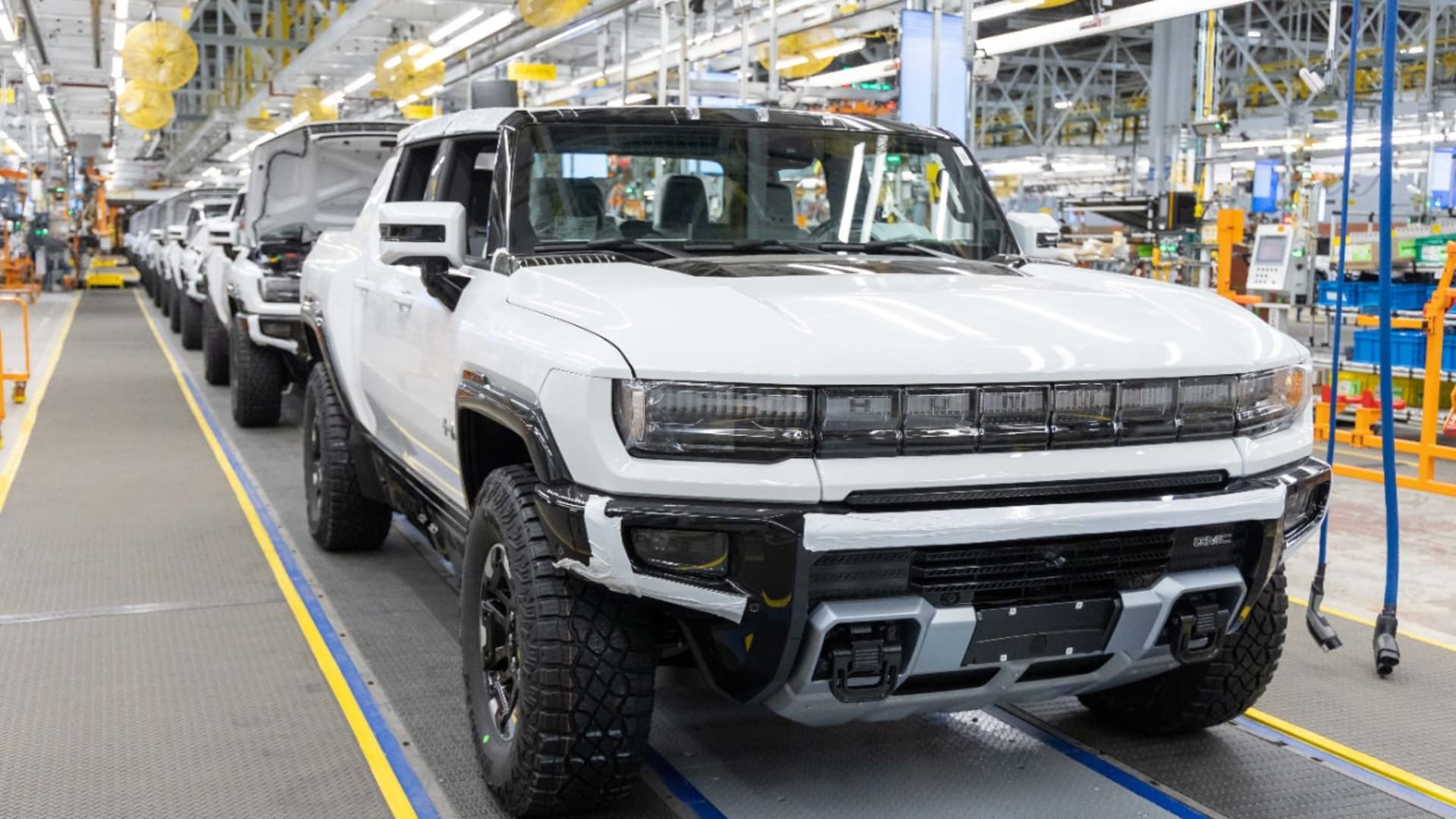Production is now set to begin at the former Detroit-Hamtramck assembly plant, less than two years after GM announced the massive $2.2 billion investment to fully renovate the facility to build a variety of all-electric trucks and SUVs.
Photo by Jeffrey Sauger for General Motors
DETROIT – President-elect Donald Trump’s victory over Vice President Kamala Harris is expected to send the U.S. electric vehicle industry into a period of uncertainty.
Republicans, led by the former president, have largely condemned EVs, claiming they are being forced upon consumers. Trump has vowed to roll back or eliminate many vehicle emissions standards under the Environmental Protection Agency as well as incentives to promote production and adoption of the vehicles such as the Biden administration’s Inflation Reduction Act of 2022.
Auto industry insiders and other officials have said it would be difficult for Trump to completely gut the IRA, but he could defund or limit EV subsidies through executive orders or other policy actions.
Several people said they would expect Trump to target federal consumer credits that currently offer up to $7,500 for the purchase of an EV rather than target industrial production credits for companies.
“The IRA will probably have some adjustments … I don’t think the IRA will go away,” David Rubenstein, co-founder and co-chairman of The Carlyle Group investment firm, told CNBC on Wednesday. “It has some really good things in it that I think Republicans and Democrats will like.”

Many of the investments into EV production under the IRA having been taking place in Republican states such as Ohio, South Carolina and Georgia.
Automotive executives are also quick to say they don’t base investment decisions on who holds the White House, but there are natural adjustments with new administrations.
“Anytime there’s an administration change, it’s an interesting time for the industry because we have to go through new policies and regulations and have to bring new people up to speed on who we are and what we do,” David Christ, group vice president and general manager of the Toyota Division in North America, said Wednesday during an Automotive Press Association event near Detroit. “Administrations sometimes change every four years, so we don’t really do a lot of modifying the strategy.”
Winners and losers?
Several Wall Street analysts have speculated legacy automakers — specifically the “Detroit” companies General Motors, Ford Motor and Chrysler parent Stellantis — would be the biggest winners of a second Trump term and Republican control of Congress.
“We see F and GM as the main beneficiaries from the Trump administration,” BofA Securities analyst John Murphy said in a Wednesday investor note. “The current environmental regime would pressure the core business of legacy [automakers, trucks,] to decarbonize by the end of the decade while shifting quickly to an EV portfolio.”
GM’s aspirations for an “all-electric future” and profitable EV business in the near term are highly reliant on federal tax credits.
Analysts had indicated EV startups such as Rivian Automotive and Lucid Group would benefit more with a Democratic win.
Toyota could also be a winner if EV regulations are reduced or eliminated, as the Japanese automaker has been slow to invest in all-electric models compared to hybrid vehicles.
Shares of GM and Ford were up in trading Wednesday, while Toyota and Stellantis, which is experiencing significant problems in the U.S., were slightly lower. Lucid and Rivian were each down, 8% and 10%, respectively.

Shares of automakers after President-elect Donald Trump’s victory.
An outlier is U.S. electric vehicle leader Tesla. CEO Elon Musk heavily campaigned in swing states for Trump, who has discussed making the billionaire a government efficiency czar.
Shares of Tesla soared 13% and earlier notched a new 52-week high.
“We see RIVN and LCID challenged, which is largely reflected in the stocks,” Murphy said. “We don’t expect meaningful issues for TSLA since it has already reached profitability and will introduce more entry level products that could be attractive for the larger public.”
Several automakers did not immediately return request for comment after NBC News and several other media outlets called the election for Trump.
Others such as the Detroit automakers and Hyundai Motor congratulated Trump and the newly elected officials across all levels of government.
“We look forward to working with the new Administration and Congress on policies that strengthen the U.S. automotive industry, which supports 9.7 million American jobs and drives more than $1 trillion into the economy each year,” Ford said.
“We congratulate and look forward to working with the President-elect, Congress, and all elected officials to ensure that the U.S. continues to lead the world in technology and innovation, to the benefit of American workers and consumers alike,” GM said.
California EV mandates
Trump is also expected to renew a battle with California and other states who set their own vehicle emissions standards, including requirements for sales of all-electric vehicles.
Current requirements under the “Advanced Clean Cars II” regulations of 2022 call for 35% of 2026 model year vehicles, which will begin to be introduced next year, to be zero-emission vehicles. Battery-electric, fuel cell and, to an extent, plug-in hybrid electric vehicles qualify as zero emission.
Before the election, automotive officials said regardless of who won the White House, many automakers will push for the mandates to be postponed.
The California Air Resources Board reports 12 states and Washington, D.C., have adopted the rules; however, roughly half of them did so starting with the 2027 model year. They are part of CARB’s Advanced Clean Cars regulations that require 100% of new vehicle sales in the state of California to be zero-emission models by 2035.
EVs made up 10% or more of local market shares in just 11 states and the District of Columbia to begin this year, according to the Alliance for Automotive Innovation, a trade association and lobby group that represents most major automakers operating in the U.S.
Auto executives and industry experts also expect Trump could roll back or freeze the Corporate Average Fuel Economy, or CAFE, standards for model years 2027-2031.







